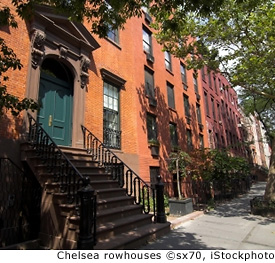Chelsea Morning
A mother and daughter revisit the past in their former New York neighborhood
by Barbara Wysocki It's November in New York and the wind is chilly on West 18th Street. My mother and I pull our coats closer as we stand staring at an unremarkable red brick townhouse. If anyone asks, we'll say we're real estate appraisers, but the chance to view this building is what we value. The object of our subtle homage is three flights up, the five-room apartment that was once the home of my maternal grandparents.
It's November in New York and the wind is chilly on West 18th Street. My mother and I pull our coats closer as we stand staring at an unremarkable red brick townhouse. If anyone asks, we'll say we're real estate appraisers, but the chance to view this building is what we value. The object of our subtle homage is three flights up, the five-room apartment that was once the home of my maternal grandparents.
We gaze in silence. Each of us is transported to our own world of remembrance. I'm reliving a childhood Thanksgiving when I overdosed on pickled cauliflower. Maybe my mom sees herself carrying a very newborn me into my first home, or perhaps she's envisioning that dark-haired prom date who became her husband. In spite of the cold, the quiet feels cozy. We stand there for a long time.
Like us, the street is hushed. There are no old friends to embrace us, not even a familiar shop owner to visit. A passing dog walker glances at us, then at the structure we're scrutinizing, but no one speaks to us. We don't expect to find much recognizable in the Chelsea neighborhood that has gone from impoverished, to dangerous, to downright trendy--all in the span of my mother's life. Neither of us has stood on this spot in decades so it's comforting to see that Number 327 is still inhabited. I wonder who climbs those stairs now, but I have no wish to see what's replaced my grandmother's flowered curtains and the rocking chair where my grandfather always sat.
"Ready to go?" I ask. My mother nods, and we head for the warm refuge of a coffee shop on the first floor of the Chelsea Market. This re-invented factory, located on 9th Avenue between 15th and 16th Streets, once housed the Nabisco bakery. Over cappuccino and cinnamon rolls, my mother recalls her childhood visits to this block-long building. In those days, it was her job to buy the cookies that were too broken to be packaged. Exchanging a precious nickel for an unmarked brown paper bag, she'd race home to find out what secret sweets lay inside. Lorna Doones were Mom's favorite, but she was grateful for any treat during the times when her father waited for work on the nearby piers.
The building's slightly uneven wooden floors and the rough brick walls hint at Mom's childhood. Then I scan the confection-laden counters next to me, and I'm struck by the culinary bounty that now draws people from all over Manhattan. Shops selling chicken pot pies and Italian mortadella could have been found in my mother's youth, but offerings of Thai and Middle Eastern cuisines reflect more recent arrivals. There's also an internationally stocked wine store, complete with tasting parties. These merchants serve a clientele that was unseen and unimagined seventy-five years ago.
There are some reassuring connections to Chelsea Market's pastry past. I count seven places with sugar-intensive take homes. Everything from almond nougat to walnut strip bread, and then there's the always appropriate, New York cheesecake. We drool politely over biscotti, blonde brownies and buttermilk bundt cakes. Of course, the price tag is considerably more than a nickel now, but it seems worth the many additional coins to reprise a long-neglected family tradition.
With our purchases securely stacked in several modern versions of the old brown paper bag, we wander out the 10th Avenue exit. Once we cross the street we turn right and head uptown, passing the Guardian of Angels church where we were both baptized. I suggest we walk over to see the sports and fitness complex on the Chelsea Pier. Mom turns me down. Maybe she doesn't want to see the docks where her father worked unloading cargo, now that they've turned it into a place where aerobics instructors help the hip unload pounds.
I'd like to tramp over to 20th Street to peek into the General Seminary to see the Gothic Revival buildings and the great trees that shaded my mother on hot days. Or we could walk over to the Hudson River where she watched the Cunard ships sail to Europe.
But I don't ask. I can see her energy is waning and the wind is blowing colder now. It's time to catch a cab and head to our midtown hotel. This pilgrimage has come to an end.
I'm not certain if my mother and I will ever make this journey again. I'm just grateful for today and the taste of the past that we shared.

